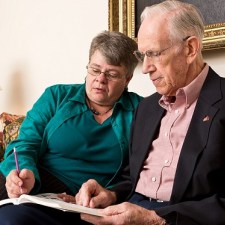Help for Alzheimer’s Caregivers

Today, more than 15 million Americans provide voluntary care for people with Alzheimer’s disease and other dementias, according to the Alzheimer’s Association. These caregivers face unique challenges that, when not addressed properly, can put their own health and well-being at risk. Understanding how a person’s memory declines will progress and the challenges at each stage of caregiving, is the first step to ensuring a caregiver’s needs are taken care of, which in turn benefits the person they care for. Many resources are available to equip caregivers with facts, tips and tools (a short list is below), but maintaining a healthy life balance starts with understanding the disease, knowing how to stay engaged, and learning to ask for and accept help.
Understanding the Disease
At its core, Alzheimer’s is a disease of the brain. As such, it ultimately affects how a loved one feels, who they are, how they think and what they do. Just as a caregiver’s range of emotions can be vast, so are the symptoms of the disease. And although it is a medical condition that affects people physically, those with Alzheimer’s disease will not essentially “look” sick until the late-stages. All of this can cause confusion for family and friends, because a loved one may act differently but appear as healthy as ever. It is also important to understand that no one experiences Alzheimer’s in the same way. When a caregiver understands just how Alzheimer’s disease can change a person, they can learn how to cope with those changes, help inform family and friends, and take comfort in the support, camaraderie and love they are providing.
Staying Engaged
When caring for a loved one with Alzheimer’s or other memory-related challenges, it is imperative to try to maximize their engagement, which means maintaining as much physical and social activity as possible for the person with the disease. This makes it even more critical for both the caregiver and the person they are caring for to stay well, and it can also help reduce caregiver stress. Engagement can be fostered through time spent with friends and family, and being a part of activities both enjoy. In fact, participating in a loved one’s favorite pastime can be joyful and stimulating. The New York Times reported a story in which “a caregiving wife gets her husband, who has serious dementia, to again enjoy golf, his former passion, by saying she wants to play. Once at the driving range with club in hand, he suddenly remembered what to do and sent the ball flying.”
Requesting and Accepting Help
There is no doubt that caregiving for a loved one experiencing the difficulties associated with Alzheimer’s disease results in a lot of change, both day-to-day and over time. Caregivers must frequently cope with new challenges, which in turn can become physically and emotionally exhausting. So often, people ask if they can help, but it may feel like a burden to accept their offer; or, it can be difficult to admit that aid is needed. It is important for caregivers not to wait until they are overwhelmed or their health begins to decline. Requesting assistance demonstrates personal strength, and it is available from numerous places, including professionals, community resources, friends and family.
For many people, their churches or other faith-based organizations help provide emotional comfort and support during stressful and confusion times. Turning to a resource such as, “Seasons of Caring: Meditations for Alzheimer’s and Dementia Caregivers,” enables the person to identify with others in a similar situation. This book is a first-of-its-kind interfaith collection of over 140 brief meditations by 71 clergy and lay-leaders, representing 17 faith communities. Each writer draws on his or her experiences to offer words of hope, encouragement, and understanding to caregivers and others facing the daunting challenges of dealing with these illnesses.
Everyone’s situation is different, but caregivers for individuals with Alzheimer’s disease or other types of dementia provide a type of support, solidarity and love that can deeply and positively impact their loved ones, and themselves as well. Only when the caregiver ensures their own well-being will the person they are caring for feel the comfort and peace they need.
List of Caregiver Resources:
Alzheimer’s Association
National Institute on Aging
Family Caregiver Alliance




